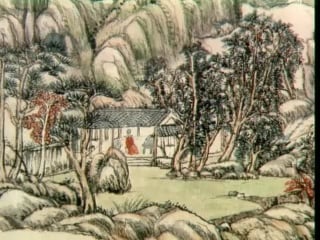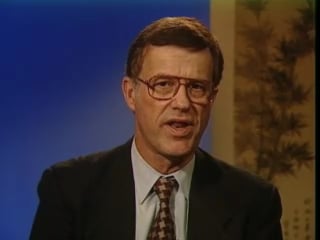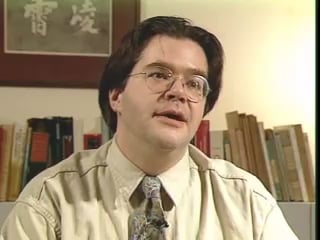Playlist: Great Tang Poets: Wang Wei (699-761)
Informed by “The Three Teachings”: The Poetry of Retreat
Transcript
Robert Oxnam: During the Tang era, Buddhist teachings were translated and increasingly taught and followed. Buddhism became the third strand of China's philosophical-religious braid.
Buddhism emphasized the transience and impermanence of life, while Daoism emphasized abandonment to the Way found in nature. Confucianism stressed moral responsibility and service to the state. These were the "Three Teachings" that informed the thought and behavior of not only the emperors of the Tang, but also of the Chinese literati.
These three traditions are reflected in the poetry of the three most prominent poets of the Tang: Wang Wei, Li Bo, and Du Fu.
Wang Wei, the first of the triumvirate, continued the tradition of "poetry of retreat" while actually serving in the Tang court.
Paul Rouzer: Wang Wei carried on many of the earlier poetic traditions — the poetic traditions involving writing about living in retirement, living in reclusion — and carried them one step further, sometimes by including the ideas of Buddhist quietism, the idea of stilling the heart of passions when you lived in reclusion.
Thus, Wang Wei in many ways combined a lot of the philosophical ideas common in Tang dynasty China: The idea of Daoist reclusion, of living away from society in order to cultivate personal values; the continuing idea of the human community, which he derived from Confucianism; and the idea of stilling the passions that he derived from Buddhism.
Wang Wei’s Country Retreat
Transcript
Marsha Wagner: He developed a rather elaborate estate in the countryside, which was part of a tradition of building a country home. It didn't have to be very far outside of the capital. It was really what we would now consider a sort of weekend retreat.
It was possible for somebody who was actively serving in the government in the Tang Dynasty to go to one of these country estates and spend a couple of days there and then go back to the palace and serve the government.
“Villa on Zhongnan Mountain”
Transcript
"Villa on Zhongnan Mountain," by Wang WeiIn my middle years I came to much love the Way
and late made my home by South Mountain's edge.
When the mood comes upon me, I go off alone,
and have glorious moments all to myself.
I walk to the point where a stream ends,
and sitting, watch when the clouds rise.
By chance I meet old men in the woods;
we laugh and chat, no fixed time to turn home.
Wang Wei's "Villa on Zhongnan Mountain" from An Anthology of Chinese Literature, Stephen Owen, ed. and trans. (New York: W.W. Norton, 1996) p. 390.
Use of Regulated Verse: “Deer Fence”
Transcript
Robert Oxnam: Wang Wei's poem "Deer Fence" is written in a form of regulated verse that was perfected in the Tang and established as the model poetic form thereafter.
The special metrical requirements produced poetry that exploited the full range of human experience within a brief, confined form — much like the sonnet in Western poetry.
"Deer Fence," by Wang WeiNo one is seen in deserted hills,
only the echoes of speech are heard.
Sunlight cast back comes deep in the woods
and shines once again upon the green moss.
Wang Wei's "Deer Fence" from An Anthology of Chinese Literature, Stephen Owen, ed. and trans. (New York: W.W. Norton, 1996) p. 393.
“Fields and Gardens by the River Qi”
Transcript
Paul Rouzer: In one particular poem of his, a good example of his so-called regulated verse, we can see how he takes some earlier Chinese poetic traditions and simplifies them and makes them more succinct within a more set and rigid verse form.
"Fields and Gardens by the River Qi," by Wang WeiI dwell apart by the River Qi,
Where the Eastern wilds stretch far without hills.
The sun darkens beyond the mulberry trees;
The river glistens through the villages.
Shepherd boys depart, gazing back to their hamlets;
Hunting dogs return following their men.
When a man's at peace, what business does he have?
I shut fast my rustic door throughout the day.
[Translation by Paul Rouzer]
“Fields and Gardens by the River Qi”: Couplet One
Transcript
"Fields and Gardens by the River Qi," by Wang WeiI dwell apart by the River Qi,
Where the Eastern wilds stretch far without hills.
The sun darkens beyond the mulberry trees;
The river glistens through the villages.
Shepherd boys depart, gazing back to their hamlets;
Hunting dogs return following their men.
When a man's at peace, what business does he have?
I shut fast my rustic door throughout the day.
[Translation by Paul Rouzer]
Paul Rouzer: Now in Wang Wei's regulated verse, as in many regulated verses written during the Tang dynasty, the poet begins in the opening couplet to set the scene. He explains where he is, what time of day it is or what season of the year it is. Basically sets the scene for what's to come.
“Fields and Gardens by the River Qi”: Couplets Two and Three
Transcript
"Fields and Gardens by the River Qi," by Wang WeiI dwell apart by the River Qi,
Where the Eastern wilds stretch far without hills.
The sun darkens beyond the mulberry trees;
The river glistens through the villages.
Shepherd boys depart, gazing back to their hamlets;
Hunting dogs return following their men.
When a man's at peace, what business does he have?
I shut fast my rustic door throughout the day.
[Translation by Paul Rouzer]
Paul Rouzer: The two middle couplets, the second and the third couplet, elaborate on that particular scene, often giving details of landscapes and so forth. However, these particular couplets are written in parallel form.
The third line and the fourth line, for example, basically set off nouns against nouns within that couplet. Verbs against verbs, adjectives against adjectives. If you actually look at the poem, you see that for example, the "sun" of the third line is placed in a parallel position with the "river" of the fourth. "Darkens," the verb "darkens" on the third line is placed against "glistens" in the fourth. "Mulberry trees" on the third line is placed against "villages" in the fourth line.
This is not just a simple aesthetic structure. It's not simply a way of organizing images. For a talented reader of Chinese poetry, these parallel couplets add to the meaning of the poem by putting certain juxtapositions against each other.
For example, Wang Wei may be concerned here with the phenomenon of sunset where all the world begins to darken, with the way that the final beams of the setting sun illuminate the river near the villages.
He sees deeper meanings in those particular couplets and the way these words are juxtaposed. For example, the setting sun, which gradually darkens, may be casting beams of light across the river causing it to glisten; he may be juxtaposing the natural world, the world of the setting sun, with the world of human cultivation of the mulberry trees in the villages. Consequently, by placing these in juxtaposition, suggesting that the human world is merely part of the natural world.
In the third couplet he creates juxtapositions of "shepherd boys" on the one side, "hunting dogs" on the other. Thus contrasting the ordinary activities of the agrarian population with the activities of hunting. Thus illuminating two particular aspects of agrarian life.
All these particular juxtapositions are very important for reading parallel couplets. And a sensitive reader, even a reader reading Chinese poetry in English translation, should be aware of these juxtapositions and how they can add to the particular meaning.
“Fields and Gardens by the River Qi”: Couplet Four
Transcript
"Fields and Gardens by the River Qi," by Wang WeiI dwell apart by the River Qi,
Where the Eastern wilds stretch far without hills.
The sun darkens beyond the mulberry trees;
The river glistens through the villages.
Shepherd boys depart, gazing back to their hamlets;
Hunting dogs return following their men.
When a man's at peace, what business does he have?
I shut fast my rustic door throughout the day.
[Translation by Paul Rouzer]
Paul Rouzer: Finally in the regulated verse in the last couplet or the fourth couplet, the poet usually summons up or sums up his own particular response to what he has said before, often with an emotional response.
Here Wang Wei responds to this particular agrarian paradise that he's described in the middle couplets. By responding how this particular scene causes a stillness in his heart allows him to cultivate his own self in a more Daoist and Buddhist way, and allows him to simply close his own door of his own retreat against the world outside.
Wang Wei has learned the particular lesson from the world around him and can at the very end withdraw within to himself. Not just withdraw into the very house that he is living in, but to withdraw into his own soul.
The Poet-Painter
Transcript
Robert Oxnam: Wang Wei was not only a poet. He was also a painter of some distinction. While associated with the Buddhist belief that the world we perceive is illusory, Wang Wei was preoccupied with how perception is bound up with human feelings.
Stephen Owen: Wang Wei is often associated with Buddhism, and he has explicitly associated himself with Buddhism in many cases. But on a deeper level, it was the way he was fascinated by looking at the world.
He was also a painter, and his poetry shows very much the eye of a painter, the way you look at a scene, construct the scene, see the balances and relationships in the scene, and often see things that people in the scene can't themselves see.
And the Buddhist side of this would seem to be often the Buddhist notion of rupa, the sort of sensuous surfaces of the world, where you can describe all the beauties, but they're hollow, they're two dimensional images.
One of the most famous lines is "the color of the mountain is between being and non-being," and, of course, what this describes is a mountain in a mist in that peculiar way in which you can just barely see a color space in the mist, and you think there's a mountain there, but in the Buddhist sense of the illusions of the world, you have this huge thing, this mountain and all of a sudden, its presence, its very existence, sort of half fades in and out. It's between being there and not being there.
-
1
 Informed by “The Three Teachings”: The Poetry of Retreat
Informed by “The Three Teachings”: The Poetry of Retreat -
2
 Wang Wei’s Country Retreat
Wang Wei’s Country Retreat -
3
 “Villa on Zhongnan Mountain”
“Villa on Zhongnan Mountain” -
4
 Use of Regulated Verse: “Deer Fence”
Use of Regulated Verse: “Deer Fence” -
5
 “Fields and Gardens by the River Qi”
“Fields and Gardens by the River Qi” -
6
 “Fields and Gardens by the River Qi”: Couplet One
“Fields and Gardens by the River Qi”: Couplet One -
7
 “Fields and Gardens by the River Qi”: Couplets Two and Three
“Fields and Gardens by the River Qi”: Couplets Two and Three -
8
 “Fields and Gardens by the River Qi”: Couplet Four
“Fields and Gardens by the River Qi”: Couplet Four -
9
 The Poet-Painter
The Poet-Painter
About the Speakers
Robert B. Oxnam
President Emeritus
Asia Society
Stephen Owen
James Bryant Conant University Professor; Professor of Comparative Literature
Harvard University
Paul Rouzer
Associate Professor, Department of Asian Languages and Literatures
University of Minnesota
Marsha Wagner
Adjunct Professor of Chinese Literature
Columbia University
Bibliography
The Art of Chinese Poetry
By James J. Y. Liu
Chicago: The University of Chicago Press, 1962
The Columbia Book of Chinese Poetry: From Early Times to the Thirteenth Century
Translated and edited by Burton Watson
New York: Columbia University Press, 1984
The Great Age of Chinese Poetry: The High T’ang
By Stephen Owen
New Haven: Yale University Press, 1981
Poems of the Late T’ang
Translated by A. C. Graham
Baltimore: Penguin Books, 1965
The Poetry of the Early T’ang
By Stephen Owen
New Haven: Yale University Press, 1977
“Tang Poetry: A Return to Basics”
By Burton Watson
In Masterworks of Asian Literature in Comparative Perspective, edited by Barbara Stoler Miller
Armonk, N.Y.: M.E. Sharpe, 1994
Related Videos
Introduction to Tang Poetry
Great Tang Poets: Li Bo (701-762)
Great Tang Poets: Du Fu (721-770)









